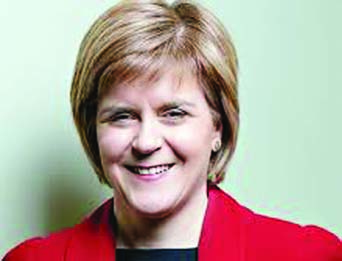
Scotland’s First Minister Nicola Sturgeon has told the BBC that Holyrood could try to block the UK’s exit from the EU.
She was speaking following a referendum on Thursday which saw Britain vote by 52% to 48% to leave Europe.
However, in Scotland the picture was different with 62% backing Remain and 38% wanting to go.
SNP leader Ms Sturgeon said that “of course” she would ask MSPs to refuse to give their “legislative consent”.
However, Scottish Secretary David Mundell said he “personally” did not believe that Scotland could block Brexit. In an interview with the BBC’s Sunday Politics Scotland programme Ms Sturgeon was asked what the Scottish Parliament would do now.
Ms Sturgeon, whose party has 63 of the 129 Holyrood seats, said: “The issue you are talking about is would there have to be a legislative consent motion or motions for the legislation that extricates the UK from the European Union? “Looking at it from a logical perspective, I find it hard to believe that there wouldn’t be that requirement – I suspect that the UK government will take a very different view on that and we’ll have to see where that discussion ends up.”
I think Holyrood blocking Brexit is unlikely in that the power arises because the Scottish Parliament has to implement European legislation. It is not a power that arises with regard to the things that matter, which is the single market and the EU treaties.
I also think that politically there would be a huge resentment from Westminster and England.
If, for example, Scotland had voted “Yes” to independence in 2014 and the Westminster parliament used the blocking mechanism to stop that, one can understand the anger in that regard.
It is a possible political scenario, but in terms of it being a likely political scenario, I think not.
When Ms Sturgeon was asked by presenter Gordon Brewer whether she would consider asking the parliament not to back such a motion of legislative consent she replied “of course”.
She added: “If the Scottish Parliament was judging this on the basis of what’s right for Scotland then the option of saying look we’re not to vote for something that’s against Scotland’s interest, of course that’s got to be on the table.” Conservative MP Mr Mundell, who also spoke to the Sunday Politics Scotland programme, said: “We have to respect the result on Thursday, even if we don’t like it – it was a UK wide vote – it was a vote by people across the UK.” Asked about the possibility of Scotland stopping Brexit, he said: “What we need to see is the legal mechanism that we go through to get to a situation of the UK leaving.
“I personally don’t believe the Scottish Parliament is in position to block Brexit, but I haven’t seen the legal documentation that you refer to in your interview with Nicola [Sturgeon].”
Following the programme, constitutional law expert and Conservative MSP Adam Tomkins tweeted that Holyrood had no power to veto the UK’s withdrawal.
Mr Tomkins – who backed the Remain side of the referendum campaign – said that while Holyrood had the power to withhold consent, that was not the same as blocking.
Earlier on Sunday, Ms Sturgeon said that she and her colleagues would begin talking to Brussels officials next week about Scotland remaining in the EU. The day after the full result was known, the Scottish leader confirmed that a second Scottish independence referendum was back on the table.
In September 2014, people in Scotland voted by 55% to 45% to stay a part of the UK.
Following the UK’s decision on 23 June to leave the EU, Prime Minister David Cameron has announced his intention to resign and a number of Labour shadow cabinet members have quit – with more resignations expected – in protest at Jeremy Corbyn’s leadership over the EU referendum.

